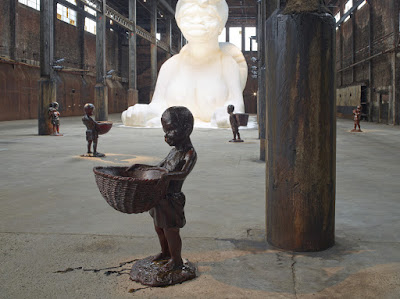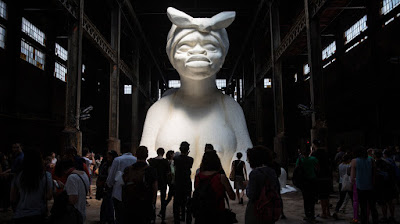Music Video
From the text:
"an alternative world where image is reality"
"transfer the familiar aspects of our world"
"bring celebrities into our lives and create a sense of familiarity with people who would otherwise be remote"
Commedia dell'arte
comedy, artisans
Italy
16th century
improvised performances
props
temporary stage
passing the hat
entertainment for high and low class
relate to peoples plight, exaggerating it
Italian Renaissance
Cultural change and achievement
time period approx. 1400 - 1600
Rebirth
prior - Dark Ages, fall of Roman Empire, intellectual darkness, economic regression.
Learning Resources for the Italian Renaissance at The National Gallery of Art. Link here.
From the text:
"an alternative world where image is reality"
"transfer the familiar aspects of our world"
"bring celebrities into our lives and create a sense of familiarity with people who would otherwise be remote"
Commedia dell'arte
comedy, artisans
Italy
16th century
improvised performances
props
temporary stage
passing the hat
entertainment for high and low class
relate to peoples plight, exaggerating it
Source link and more info here.
Italian Renaissance
Cultural change and achievement
time period approx. 1400 - 1600
Rebirth
prior - Dark Ages, fall of Roman Empire, intellectual darkness, economic regression.
Learning Resources for the Italian Renaissance at The National Gallery of Art. Link here.
Max Fleischer, Bunny Mooning (1937)
Music Video
Presentation of music and pictures together.
Visual aspects of musical acts become important considerations for artists like Elvis Presley and the Beatles (appeared on TV and in film).
Mid-1980's video standard.
Closer connection to the stars.
Simulated live performances.
Music Video and Commedia, Common Ground:
"use shorthand to communicate succinctly and visually".
"…the transformation potential of imagery and entertainment to create the bizarre, otherworldly, and intriguing qualities that characterize music videos."
"a narrative ultimately completed by the viewer"
-masks - key characters readily identifiable (important-quick reference for audience)
-mask of celebrity, mask is public image
-hold attention of viewer
-sexuality is spectacle, erotic movements and choreography
-Challenges idea of reality.
-messages of aggression, misogyny, drug culture to segments of the population that do not engage in these activities - cathartic experience.
cathartic |kəˈTHärtik|adjective1 providing psychological relief through the open expression of strong emotions; causing catharsis: crying is acathartic release.2 Medicine (chiefly of a drug) purgative.nounMedicinea purgative drug.DERIVATIVEScathartically adverbORIGIN early 17th cent. (in medical use): via late Latin from Greek kathartikos, from katharsis ‘cleansing’ (seecatharsis) .
Masks
-one's virtue is maintained as long as identity is undisclosed.
Miley Cyrus and Robin Thicke, 2013
Mid-1980's video standard.
Closer connection to the stars.
Simulated live performances.
Launched 1981.
Videos for everyone, all the time.
Previously 1940's 60's special equipment.
Switch to internet showing videos.
MTV goes to reality TV
Madonna, Vogue, 1980's, iconic images.
icon - a person or thing regarded as a representative symbol of something
Music Video and Commedia, Common Ground:
"use shorthand to communicate succinctly and visually".
"…the transformation potential of imagery and entertainment to create the bizarre, otherworldly, and intriguing qualities that characterize music videos."
"a narrative ultimately completed by the viewer"
-masks - key characters readily identifiable (important-quick reference for audience)
-mask of celebrity, mask is public image
-hold attention of viewer
-sexuality is spectacle, erotic movements and choreography
-Challenges idea of reality.
-messages of aggression, misogyny, drug culture to segments of the population that do not engage in these activities - cathartic experience.
cathartic |kəˈTHärtik|adjective1 providing psychological relief through the open expression of strong emotions; causing catharsis: crying is acathartic release.2 Medicine (chiefly of a drug) purgative.nounMedicinea purgative drug.DERIVATIVEScathartically adverbORIGIN early 17th cent. (in medical use): via late Latin from Greek kathartikos, from katharsis ‘cleansing’ (seecatharsis) .
Masks
-one's virtue is maintained as long as identity is undisclosed.
Miley Cyrus and Robin Thicke, 2013



























